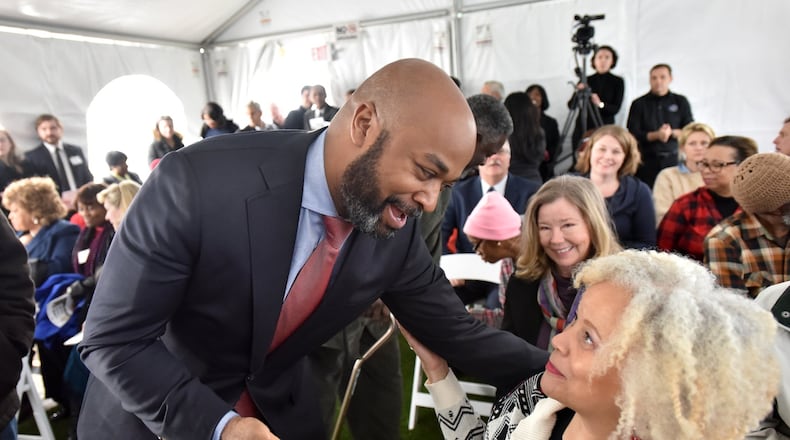Lynne Alston-Leonard never thought she’d be able to afford to move back into her former address in Atlanta’s Old Fourth Ward, but there she sat Thursday at the opening of the new City Lights building.
The five-story housing complex, designed for seniors on fixed incomes, replaces one of two Village of Bedford Pine apartment buildings that burned to the ground in 2005.
Since then, interest in Old Fourth Ward housing has skyrocketed.
Older houses, small apartment buildings and vacant land along Ralph McGill Boulevard, for instance, are increasingly being replaced by luxury apartments and townhomes costing more than $600,000.
“This gives me the affordable opportunity to stay in my community,” said Alston-Leonard. “I can live Intown where I can walk to a lot of amenities. And it gives me access to the Beltline like everybody else.”
Intown affordability is increasingly becoming an issue for elected officials. In a report earlier this year, Georgia Tech researchers found the city has lost 5 percent of its affordable units every year since 2012.
Ryan Gravel, who seeded the Beltline idea in a graduate thesis, resigned from the Atlanta Beltline Partnership in September because of concerns about affordability and equity along the trail.
In the upcoming race to replace Mayor Kasim Reed, “This has to be a top campaign issue,” said Atlanta City Councilman Andre Dickens, who is not running for the seat but has been an outspoken advocate of affordable housing. “We have to transform this city so that it works for everyone. This is an equity issue.”
Already some mayoral candidates, such as state Sen. Vincent Fort (D-Atlanta) and Atlanta City Councilwoman Keisha Lance Bottoms, have spoken out on the issue.
During an October protest by Georgia State University students demanding resident involvement in plans for Turner Field, Fort spoke out on the need to keep the area affordable. The school plans to redevelop the area around the Atlanta Braves former home, but some worry it will drive up housing prices and displace longtime residents.
Bottoms in November introduced legislation that would create “displacement free zones” across Atlanta to prevent the eviction of low-income property owners and small businesses because of gentrification.
Atlanta City Councilman Kwanza Hall, who represents Old Fourth Ward, lauded the partnership between the developer of City Lights, Wingate Companies, and city, state and federal housing agencies, which led to the new senior residential complex.
Hall, who is rumored to be interested in throwing his hat in the ring for mayor, said redevelopment of Bedford Pines had been discussed for years. But as a property designed for Section 8 and low-income residents, its fate was tangled in the bureaucracy.
“This has been a long, long time coming,” he said Thursday.
About the Author
Keep Reading
The Latest
Featured



